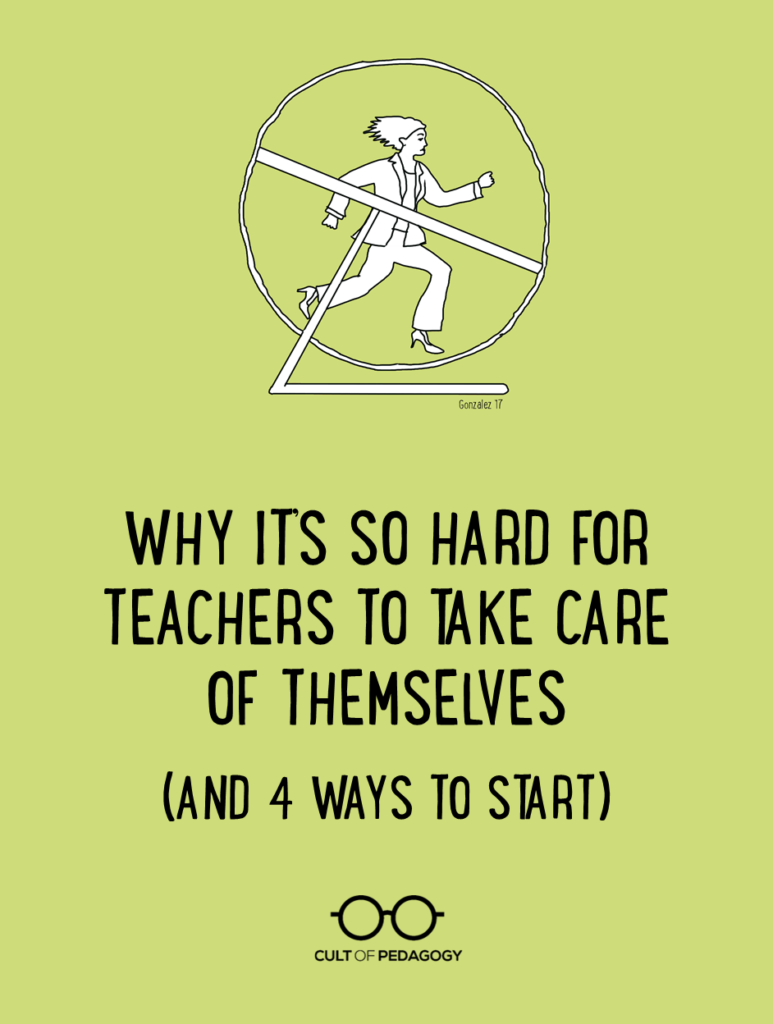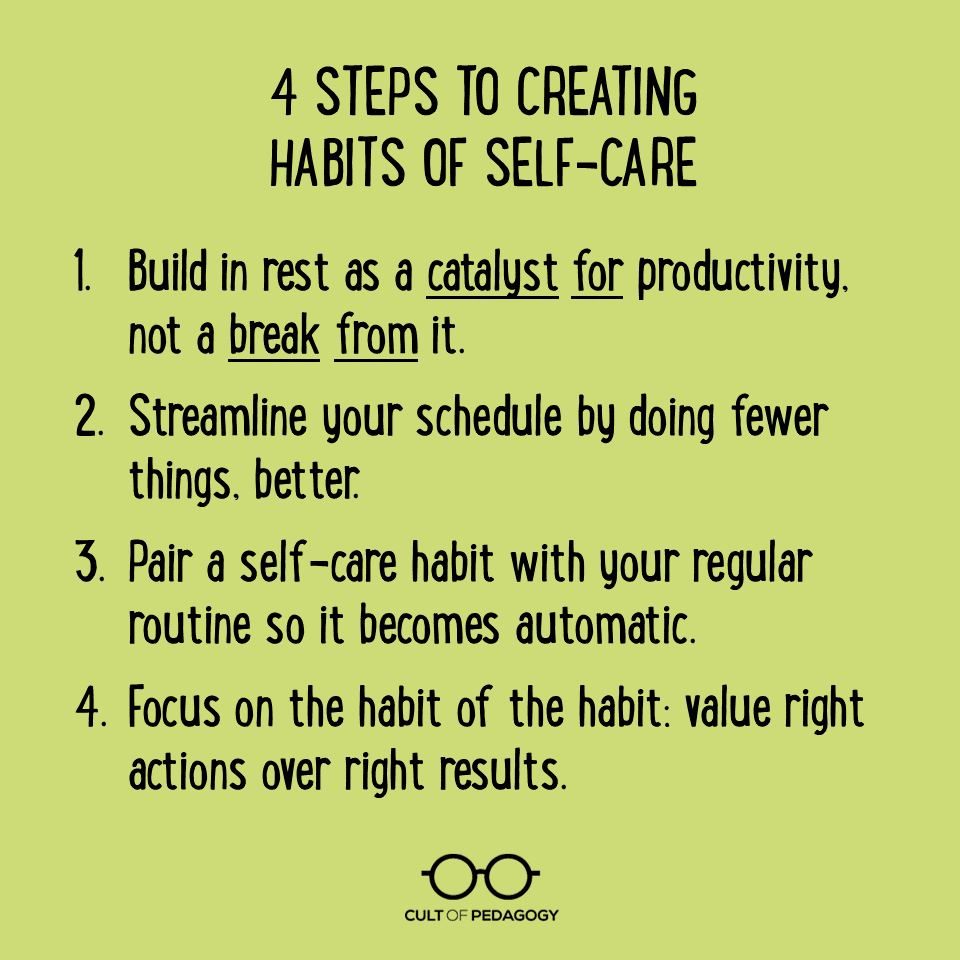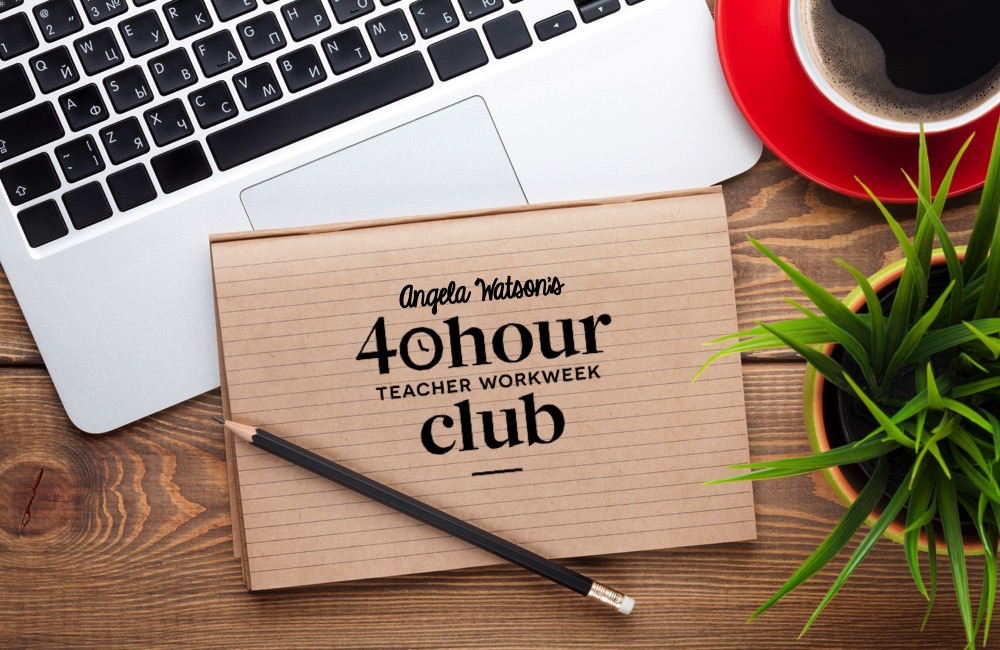Why It’s So Hard for Teachers to Take Care of Themselves (and 4 Ways to Start)

Listen to my interview with Angela Watson (transcript):
As a whole, teachers aren’t great about taking care of themselves. You work too many hours, don’t get enough sleep or exercise, eat too many unhealthy foods, and don’t spend enough time doing things that refresh and energize you.
Too many teachers have reached the conclusion that this lifestyle is just part of the job; there simply isn’t enough time to be a good teacher and take care of yourself. Self-care is something you’ll get to over breaks or in the summer, right?
Unfortunately, this is kind of a recipe for disaster. Teaching is consistently recognized as an incredibly high-stress career, which is only compounded by the fact that many of you are not doing things that would help you manage that stress.
The good news is that it doesn’t have to be this way.

Angela Watson
Angela Watson has spent the past couple of years really focusing on how to help teachers live more balanced lives. In her 40 Hour Teacher Workweek Club, she takes teachers through a year-long program designed to help members get organized, streamline routines, and be truly intentional about how they use their time. The typical member shaves over 10 hours off of their work week, with others reporting even more dramatic results.
Angela and I have already talked about some powerful ways teachers can save time, but we got together again to narrow our focus on the problem of self-care. In our podcast interview (which you can listen to above), we talk about why teachers have such a hard time taking care of themselves, then we look at four changes you can make to turn that around.
Why do teachers struggle to make time for self-care?
We think busy is normal.
“We have to decide to reject that notion that being busy is just the way life has to be,” Angela says. “Busy is normal, but normal is not the same thing as healthy, and we can accomplish a lot of things without feeling busy when we build in that time for self-care.”
We don’t realize how dire the situation really is.
Angela explains how easy it is to put off self-care because other things seem more urgent, and in general, we feel okay. “We tell ourselves, ‘Oh, next year, I’ll know the curriculum better. Next year, my child will be older and more independent. Next year, we’ll be all moved into the new house, and I won’t be distracted by that.’ But next year some new demand on our time always pops up. We can’t wait until our body is physically manifesting these symptoms of stress to decide to take care of ourselves.”
It’s hard to say no to people and things we care about.
This can be a chronic problem for teachers, whose time is always in demand at work and at home. For someone who is used to being the go-to person, saying no feels wrong. “We’ve all heard that analogy of putting your own oxygen mask before you can assist others,” Angela says, “but actually, living that out is really, really challenging.”
What do we mean by self-care?
Self-care doesn’t necessarily mean a trip to the spa; it can and should mean different things to different people. Angela encourages people to choose a self-care habit that fits their personality and needs. It should be:
- Something you want to maintain permanently
“We’re not looking for quick fixes here. (Going to the spa) once every six months is not going to fix the problem for most people. It has to be something you can stick with and something that you can make a regular part of your life, because otherwise it just won’t happen.” - Something that has a meaningful impact on your well being
“Don’t just pick whatever sounds easiest, or whatever sounds fun. You want it to be something that’s going to take a weight off your shoulders and give you this real sense of satisfaction.”
Here are some examples of habits chosen for a person’s specific needs and personality:
- If you feel like everyone’s making demands before you’ve woken up and gotten mentally prepared for the day, getting up 15 minutes earlier for some kind of morning ritual (meditating, reading, journaling, exercising) might be what’s needed.
- If you feel as if you’re going nonstop from sun up to sun down and don’t have a minute to yourself, some kind of midday break—even 5 minutes of listening to music—could do a lot to re-energize you for the day.
- If you look forward to when everyone’s asleep but you’re too tired to enjoy the quiet, choose night time rituals like a hot bath or going to bed half an hour early to read or watch TV.
- In our conversation, Angela talks about needing to get fresh air every day, and I started thinking about how much benefit I would get by building in time to clean off my desk once a day in order to make me feel more focused.
Four Steps to Make Time for Self-Care
1. Build in rest as the catalyst for productivity, not a break from it.
Too many people work until they drop, or they view rest and sleep as something to do after work is done. Angela advises us to view rest differently, as an essential tool for productivity. By looking at it this way, we will see it as a necessary part of our schedule, rather than a diversion from it.
“You are not a machine,” she says. “You can’t just program yourself to perform at optimal levels 24 hours a day. You have to have rest in there, and it doesn’t necessarily mean this hour-long nap in the afternoon. It could just be turning off the lights in your classroom for a few minutes after dismissal. Or for many people, they find themselves checking their phones all day long, checking social media, checking email. If you can substitute one or two of those checking times with just silence and stillness, that can make a huge difference in your energy levels and your ability to focus and concentrate.”
2. Streamline your schedule by doing fewer things, better.
“Self-care can’t just be one more thing you add to your plate,” Angela says. “You have to eliminate things that are not the best and highest use of your time.” Instead of trying to fit in as many things as possible, she says, think about things you can let go of to create space for your higher priority of self-care.
“Productive people are always analyzing whether something is really necessary, and whether it’s really necessary right now. They’re always re-evaluating their priorities and shifting tasks around, because there’s just no way you’re ever going to have enough hours in the day to do everything that you want and you need to do.”
This is where saying no becomes vital, and one of the best ways to get better at it is to just do it once. “If you say no once,” Angela says, “you’ll find that people will stop asking you so many times. They realize, ‘Oh, okay, this is a person who really protects boundaries around our time, and doesn’t just say yes to be a people pleaser, and isn’t just going to bend over backwards any time I need anything,’ and they will stop asking you so much.”

3. Pair a self-care habit with your regular routine so it becomes automatic.
“This is a really powerful principle that is based heavily on neuroscience,” Angela explains, “this idea that you can pair a new habit with an existing habit to make it easier to lock that new habit into place. Look for something that you already do automatically, and integrate self-care into that.”
“So, when you get in the car in the morning, you put on your favorite song that uplifts and inspires you. Do the same thing, time after time, and it will create this almost Pavlovian kind of response, where as soon as you finish cleaning up dinner, you crave that nice hot bath, or as soon as the kids leave the classroom at the end of the day, you’re craving that 60 seconds of deep breathing to just clear your head and to energize yourself for the rest of the day’s tasks. You’re relying on the strength of an existing habit to make that new habit automatic, and it’s a lot easier than relying on willpower or trying to make a decision..should I do this, or should I not do it? When am I going to take care of myself, when will I have time for this today? You’ll follow through a lot more easily with your self-care goals if it’s part of a habit.”
4. Focus on the habit of the habit, so you’ll value right actions over right results.
New habits are really easy to skip because they’re not well-established, so it’s essential that you prioritize creating and sticking to a habit if you want your self-care to become a regular part of your life.
“Each time you go back to the old habit, you are strengthening neural pathways in the brain and muscle memory in the body that will make you want to default to that habit again in the future. So breaking the habit ‘just this once’ won’t hurt you in the sense that it will wreak havoc in that area of your life…it will wreak havoc on your HABITS. Assume that what you’re doing today is what you’ll do tomorrow, next week, next month, next year, and so on and so forth. This will make you hyperfocused on the choices you’re making now in the moment, rather than assuming your future self will be more disciplined or will have more free time.”
And if you’re ready to make work-life balance a serious priority, learn more about the 40 Hour Teacher Workweek Club here:

Disclaimer: I am an affiliate for the 40 Hour Teacher Workweek Club. That means if you decide to join after visiting the club through my link, I will get a small commission for referring you.
Join our mailing list and get weekly tips, tools, and inspiration—in quick, bite-sized packages—all geared toward making your teaching more effective and fun. You’ll get access to our members-only library of free downloads, including 20 Ways to Cut Your Grading Time in Half the e-booklet that has helped thousands of teachers save time on grading. Come on in!!